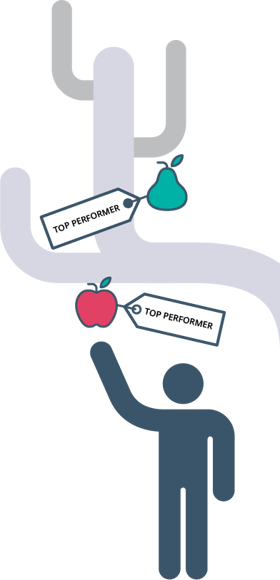
How to pluck the best salespeople directly from the tree
Wouldn’t it be great if you could simply stretch out your hand and have the world’s highest performing salesperson appear before you by magic, eager to join your team?
What if there were a great cosmic fruit tree outside your door, from which you could harvest The Golden One to fill any open sales position? Imagine how far ahead of your competition you would be.

Of course, we all know these fantasy scenarios are ridiculous.
At least, we think we know that. Yet many sales organizations behave exactly as though great salespeople grow on trees, ripe for the plucking, fully formed and ready to make our organizations great.
Here’s how to stop living in that fantasy world and cultivate a real-life sales team capable of becoming the best in your industry.
1. Stop dreaming about fruit, and start planning a pie
Fruit trees are fantastic. But most of us would get tired of living off of nothing but fresh fruit all day every day. Most of the time, the food we eat is more like a pie: A collection of ingredients, combined in a pleasing way, and baked to perfection.
Think of salespeople like fruit. You can “pluck them off the tree” by hiring them, and they might perform well in some circumstances without much development, but there’s a good chance they won’t be highly effective for you until you recognize that they need something more than just to be plucked.
In other words, you need to recognize that salespeople are not born fully formed, but rather grown and developed.
Salespeople are not born fully formed, but rather grown and developed.
Even mature and well established salespeople will need training and guidance after you hire them, because no two sales environments are exactly the same. A salesperson who performed well somewhere else, may not perform as well for you if their skills, training, and approach aren’t a precise fit for your organization and your customers.
And even a great salesperson can always be better.
2. Develop a great recipe (or two or more)
Just like your salespeople aren’t born as high performers, they also weren’t born knowing exactly what your customers need at every stage of their buying experience.
In order to bake a pie that your customers want, you need to develop a recipe that matches their taste.
In other words, you need to know how your customers want to buy, and develop a sales process that helps them do exactly that. That’s your recipe.
Once you have a winning recipe, it needs to be repeated throughout your organization in every circumstance where it’s appropriate, recognizing of course that different customers will want different things.
Your recipe is your sales process. And a sales process isn’t just a dropdown menu, any more than a recipe is a list of ingredients.
Your process should tell salespeople what to do at each step, how to progress a customer through the stages, from milestone to milestone, all the way to the sale (and beyond). It also needs to be dynamic and change based on circumstances, like the prospect's industry, the competitive situation, and which stakeholder you are engaging with.
3. Bake in the oven
So you want to bake a pie, but you’ve only got a stovetop with which to do it.
I’m sure it’s possible.
But you’re going to spend a lot of time and resources figuring it out, buying or making tools to make it possible, and babysitting the pie while it bakes to prevent it from burning… and you’re probably still not going to be happy with the outcome.
It’s much better if you just make sure your kitchen is equipped with an oven at the outset.
The same thing happens if you try to grow your sales team using outdated or badly matched technologies. You don’t just need a CRM. You need tools that guide your salespeople through the sales process, checklists and milestones, a content hub to deliver content in context and track engagement, and analytical insights that help you continually improve your process.
4. Guide and coach your team
I may be stretching the analogy a bit thin here, but even with the best recipe and excellent ingredients, pies don’t make themselves. You need to develop an effective guidance system and coaching cadence to help your salespeople remain accountable and continually grow in their performance. Your system should enable you to develop master pie chefs who in turn can develop other pie chefs… Yes, I’m definitely stretching the analogy :)
The point is that great salespeople don’t just grow on trees, so if you want your team to be the best, you need to do more than hire well. You have to support, guide, train, coach, and enable.
In my book, Stop Killing Deals, I lay out the framework you need to take your sales team from an assortment of delicious ingredients to a beautifully baked pie your customers can’t resist.
Yes, I’ve officially broken the analogy.
Stop Killing Deals is for any sales leader who wants to know how to develop a world-class team, and now it’s available in audiobook format, which you can download here. I had a ton of fun writing and recording it for you, and I would love to hear what happens when you apply its principles in your organization.

By George Brontén
George is the founder & CEO of Membrain, the Sales Enablement CRM that makes it easy to execute your sales strategy. A life-long entrepreneur with 20 years of experience in the software space and a passion for sales and marketing. With the life motto "Don't settle for mainstream", he is always looking for new ways to achieve improved business results using innovative software, skills, and processes. George is also the author of the book Stop Killing Deals and the host of the Stop Killing Deals webinar and podcast series.
Find out more about George Brontén on LinkedIn







